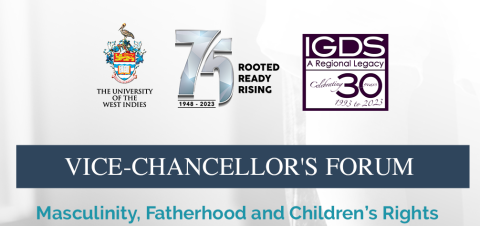
The UWI Regional Headquarters Jamaica. Tuesday, November 14, 2023. The following editorial is co-authored by Marcus Kissoon, Gender and Child Rights Activist and Professor Diana J. Fox, University Director, Institute for Gender and Development Studies at The University of the West Indies.
Each November 20 on World Children’s Day, adults around the world come together to listen to children in support of UNICEF’s call for a more inclusive and equitable world. Just 24 hours before on November 19, organisations and governments around the world recognize International Men’s Day as an opportunity for men to reflect, converse and act on their important contributions to society.
The well-being of children and the well-being of men are closely linked. Children’s capacity to thrive requires the active participation of parents and caregivers in the lives of children. Yet some roles of parenting are met with resistance by some men which results in fear and discomfort in engaging in essentially what is care work. Scholar, Dr Keith Nurse, tells us that men who experience their masculinity in contradictory terms, live in constant fear of being perceived as effeminate by others. The fear of being unmasked may be viewed as the basis for homophobia, the backlash against feminism, men-on-men violence, and domestic violence against children and women, together putting men and their masculinity in a state of crisis. This year’s International Men’s Day theme, “Zero Male Suicide” brings attention to the enormous stresses on men and their own health, such a fundamental ingredient in their capacity to care for their own children.
Children are too often excluded from conversations about social life that involve them directly, due to controversy around their agency vis-à-vis parental authority. Debates around the region on lessons like comprehensive sexualities education, and safeguarding issues on child sexual abuse (which affects 1 in 3 girls and about 1 in 5 boys in the region) have left children uninformed about their rights to be free from sexual violence and confused about those who are supposed to be their protectors. According to children’s rights advocate, Marcus Kissoon, boys negotiate remaining silent with disclosing sexual abuse. Revealing sexual abuse exposes them as failures in two dominant characteristics of hegemonic masculinity—the capacity for self-protection and heterosexuality. Just as boys suffer in silence, girls do the same, victimised by male relatives, with mothers too often unwilling to believe their daughters, whether through denial, shame, or fear.
On November 20, 2023, The University of the West Indies (The UWI) Regional Coordinating Office of the Institute for Gender and Development Studies (IGDS), as part of its anniversary of “30 Years of Advocacy for Gender Justice” unites these two important observances through a panel to discuss “Masculinity, Fatherhood and Children’s Rights”.
Hosted under the umbrella of the Vice-Chancellor’s Forum series, and streamed live on UWItv, panellists will share their work around these themes, focusing on the significance of fatherhood in supporting children’s physical, psychological and cultural well-being within Caribbean societies and beyond.
The panel will be moderated by University Director of the IGDS, Professor Diana J. Fox; Dr Gabrielle Hosein, Senior Lecturer in the IGDS St. Augustine Unit will lead a vibrant Q&A with this group of pro-feminist activists, academics, and gender and child justice advocates—including Dr Keith Nurse, Marcus Kissoon, alongside The UWI Pro Vice-Chancellor, Graduate Studies and Research, Professor Aldrie Henry-Lee; Patrick Lalor, Policy and Advocacy Officer, Jamaica AIDS Support for Life; and Dr Tinuade Ojo, Head of the Women’s Studies Unit at the Institute for Pan-African Thought and Conversation at the University of Johannesburg.
Ojo’s perspective from South Africa demonstrates how these issues are not the exclusive domain of the Caribbean. The panel will unpack shifts in masculinities and their implications for children's rights to education, living free from violence—family violence, gang violence—adequate nutrition, healthcare, and other rights enshrined in the Convention on the Rights of the Child. Gender justice advocates will interrogate the value of fathers not only as disciplinarians and breadwinners but as nurturers, caregivers, participants in domestic labour, and as such, central to the development of children, and by extension, societies.

